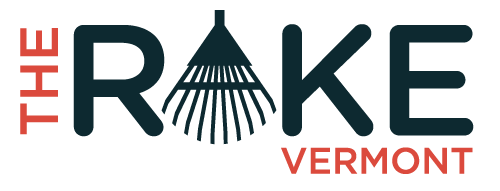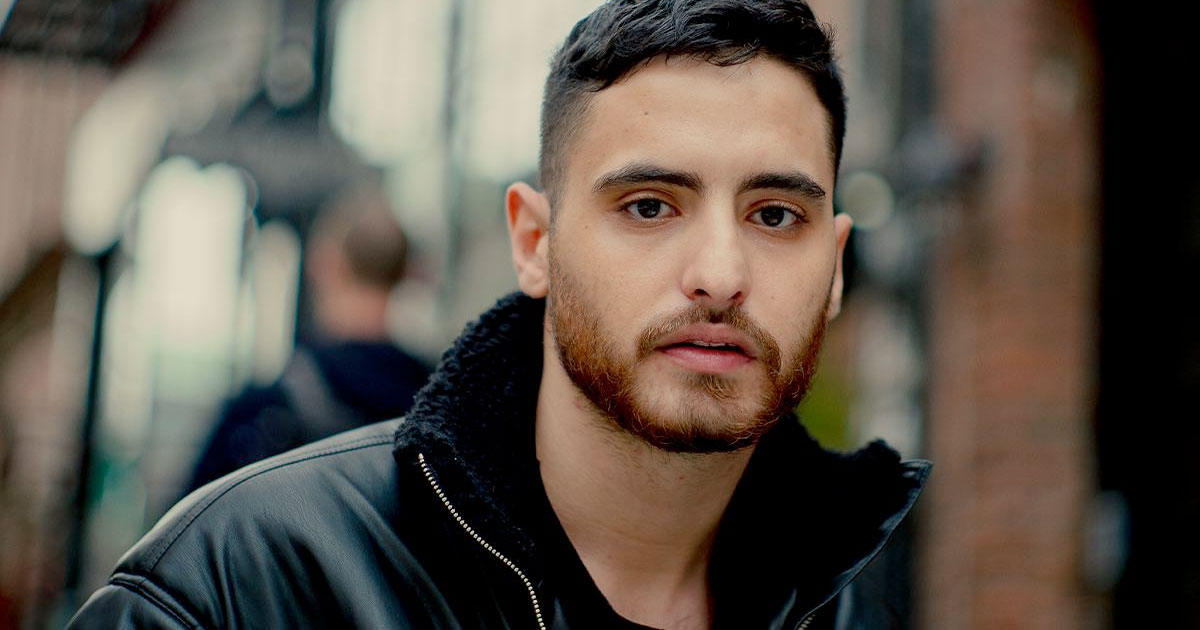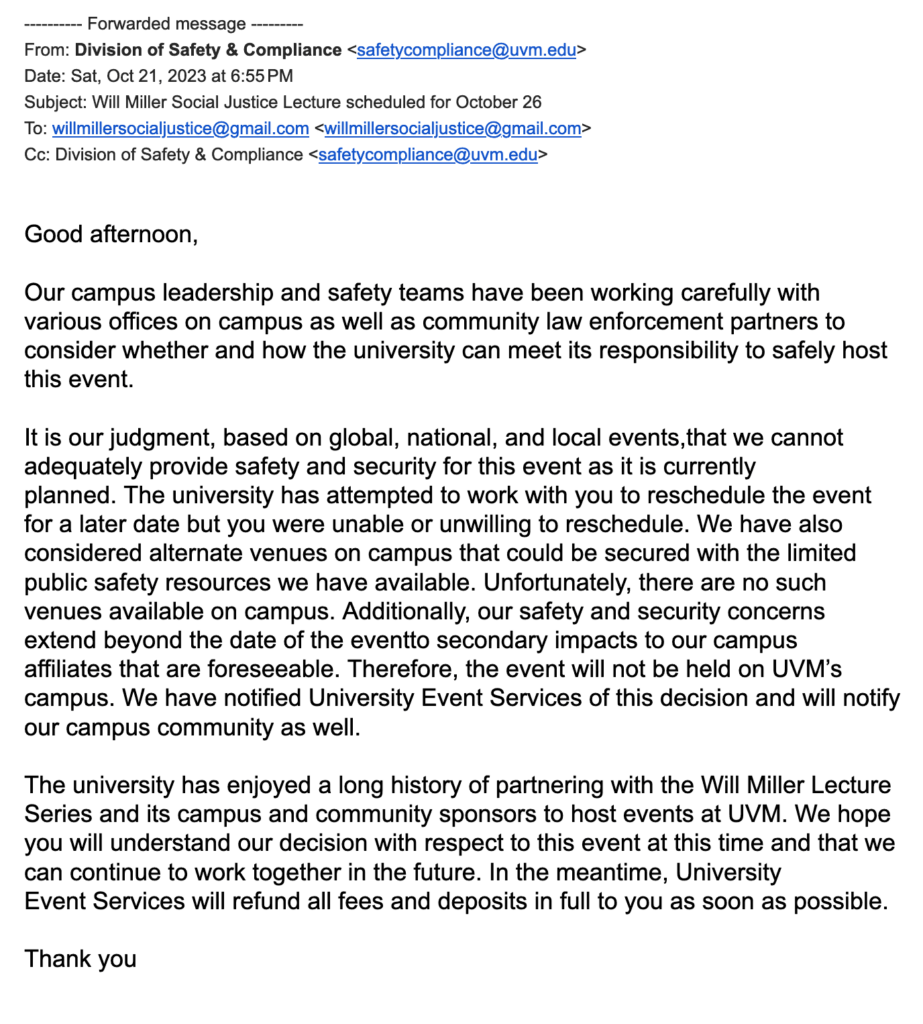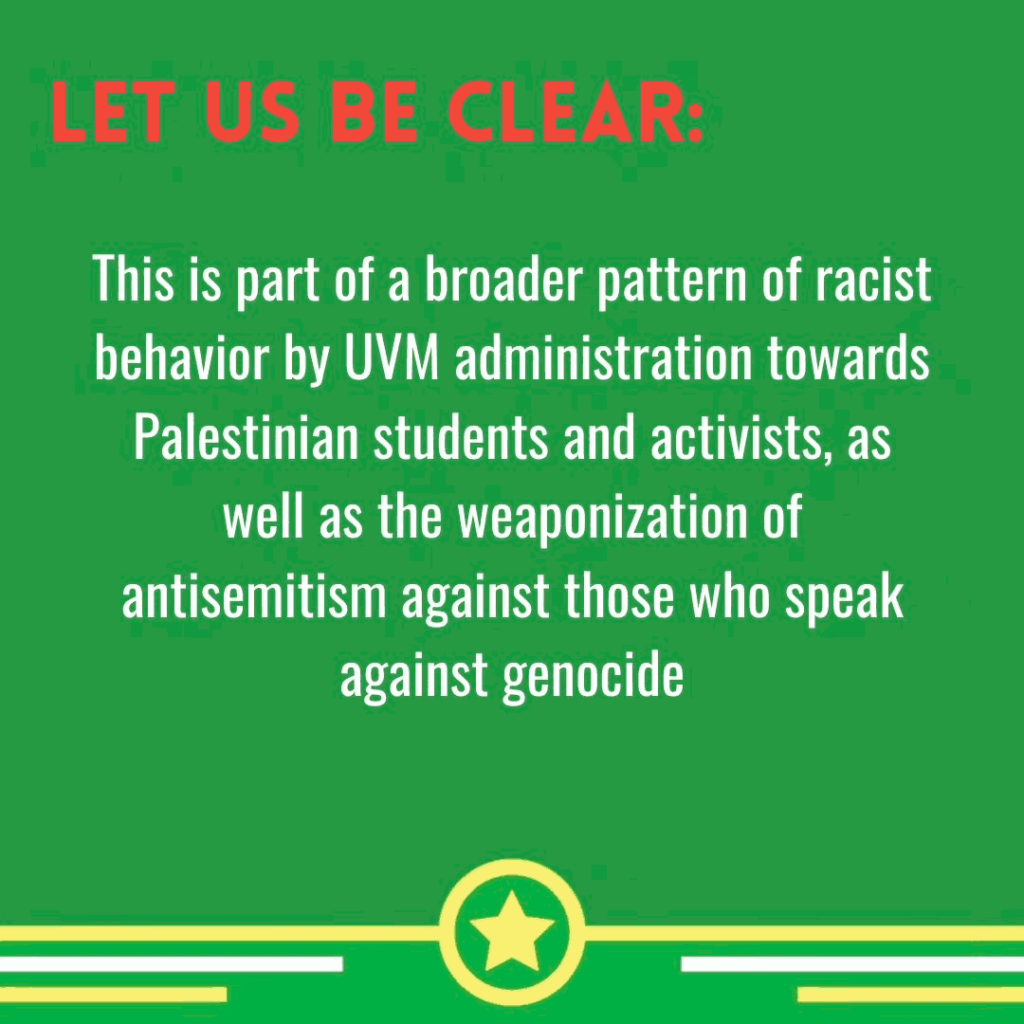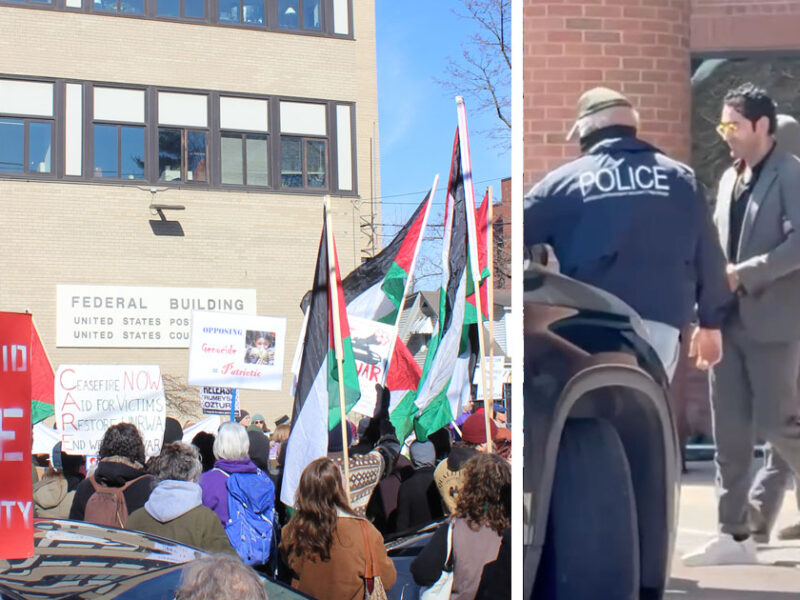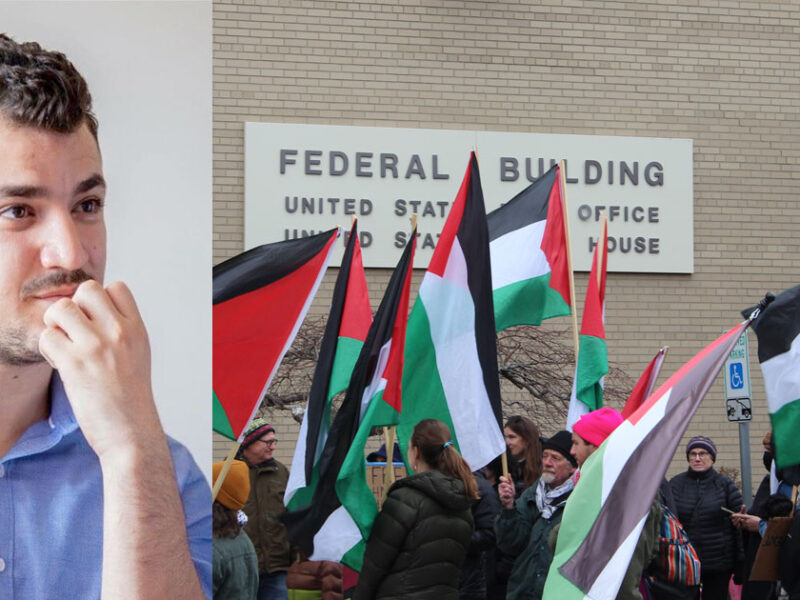Lecture was held online, video at bottom
At dusk on Saturday, Ann Lipsitt received an email that would upend months of planning.
Lipsitt is a board member of the Will Miller Social Justice Lecture Series, an organization that was to host Palestinian journalist and poet Mohammed el-Kurd this Thursday at UVM. As with their previous lectures, they reserved a large space on campus months ago and were co-sponsored by university academic departments. The event was to be in the Livak Ballroom, a large event hall on the top floor of the Davis Center.
The email, unsigned and sent by the UVM Division of Safety & Compliance, informed her that the event would not be taking place, stating, “we cannot adequately provide safety and security for this event as it is currently planned.”
The email arrived just a few hours after the Will Miller board received the good news they were waiting for: final confirmation that el-Kurd was able to attend. His busy international travel schedule, and at times, his safety, had been thrown into question due to the escalating war in Israel. Without a suitable venue for Thursday, and with el-Kurd’s schedule too packed to delay it, she called a fellow board member to not go ahead with purchasing el-Kurd’s ticket from New York to Burlington.
“At no time were we brought into [UVM’s] discussion about what else we might do to bring el-Kurd’s voice to Vermont,” Lipsitt said. “It was a done deal.”
An email that raises more questions than answers
UVM Safety & Compliance’s email did not specify the “global, national, and local events” that brought them to their conclusion. The “alternate venues” mentioned are not named, nor were any of their safety criteria listed. What makes the Livak Ballroom less safe than other venues, despite the Davis Center’s top floor hosting many high profile officials, including Joe Biden?
The passage that drew the most concern from UVM community members was “our safety and security concerns extend beyond the date of the event to secondary impacts to our campus affiliates that are foreseeable.” What secondary impacts did UVM identify, and to which campus affiliates? Who would create that impact: the speaker, the attendees, possible protesters? Despite their stated foreseeability, the email does not enumerate them, nor how long after the event they might persist, nor why a postponement of the event would presumably avoid such impacts from simply happening at a later date. Would those secondary effects be enough to cancel the event entirely even if UVM found an alternate venue? Did university officials consider the secondary impacts of canceling the event?
In response to detailed questions about their conclusions and how decisions were made, UVM replied to The Rake with a general statement that offered no clarity beyond the original email Lipsitt received on Saturday.
For students, faculty, and staff, the cancellation of the lecture has raised serious questions about the university’s decision making, transparency, and its constitutional duty to viewpoint neutrality.
Faculty and staff respond
Faculty in two academic departments, English and Sociology, voted more than a month ago to co-sponsor the event. Neither department was consulted or informed in advance of its cancellation.
Jennifer Strickler, chair of the sociology department, told The Rake that she didn’t receive word from the university at all. “I still have not heard from anybody in the UVM administration telling me that the event is canceled or why it is canceled,” she said Monday. “I only know that because of the Will Miller board making it public.”
The suddenness of the decision, the lack of prior engagement or communication, and the lack of specificity in the announcement raised red flags for Strickler. “I feel like that’s something that we need to clarify at UVM. If an academic department is sponsoring the speaker, what are the justifications for canceling that and what is the procedure?” she said. “That gives me concern about shared governance at UVM.”
Strickler noted that over the past few weeks she’s heard from four students who objected to the event, and seventeen who voiced their support for it. While acknowledging that it is a “difficult time” at the moment, Strickler said, “If something is controversial, let’s talk about it. That’s one of the skills that I want UVM students to get experience with here on campus and take with them in the larger world.”
Reached for comment, the leadership of UVM Staff United, the union comprising clerical, specialized, technical and professional staff at the university, fit the cancellation within a larger pattern of administrative actions marked by a lack of transparency and communication. “Particularly in light of how ‘Openness’ is one of the six core values that make up the University of Vermont’s Our Common Ground code of ethics, it is deeply unfortunate for staff to learn of this event’s cancellation from a reporter seeking comment rather than from our own administration,” wrote Communications Lead Cameron Ishee. “Freedom of expression, especially when it comes to art in a time of crisis, is not just a human right but is essential to the functioning of any healthy society. To intrude on that in any way necessitates a heavy burden of justification which, at this time, the University has not met, because they have not communicated with us about this at all.”
Matt Vogel, executive director of UVM Hillel, wrote in a public statement, “Hillel at UVM understands that the Will Miller Social Justice Lecture Series event this week was cancelled due to security concerns. We reject any claims that Jewish groups or people are responsible for UVM’s decision to cancel the event.”
Students respond
Several student groups have voiced their opposition to the lecture’s cancellation.
“UVM’s cancellation of this event, as reprehensible as it is, is not isolated,” a spokesperson for UVM Students for Justice in Palestine wrote to The Rake. “Our students have faced doxxing, firings, selectively enforced disciplinary proceedings — the list goes on. Though we have seen an outpouring of support for Palestine from students, faculty and the surrounding Burlington community, the problem clearly lies at the helm of UVM, entrenched in the upper levels of the administration.”
The UVM Union of Students conveyed similar sentiments, adding, “The demand we’ve communicated is that UVM must take steps to ensure that students are not the props of large organizations and that students can express support for Palestine without fear. In the longer term, we want the administration to boycott, divest & sanction the apartheid government of Israel, just as UVM did against South Africa.”
A spokesperson for UVM Young Democratic Socialists of America, which held a presentation on Palestine last week to a packed classroom of students, said that the quick turnaround time of their event was why it could be held without administration pushback. “We, YDSA, received little backlash for our event—we received one angry email and had posters advertising our presentation torn down,” they wrote. “However, because of short notice there was no time for an organized attempt to cancel our event, and we did not receive any institutional pressure to do so.”
The community responds
Bella Fearn and Kason Hudman of the Peace & Justice Center, a frequent co-sponsor of Will Miller lectures, wrote that UVM’s actions were “unprofessional and unreasonable toward the various groups sponsoring this event,” and that “denying Palestinian voices a platform perpetuates ignorance, hindering the potential for increased knowledge, empathy, and comprehension to pave the way for peace.”
The Champlain Valley DSA has launched a petition, “Let Mohammed El-Kurd Speak At UVM,” which at press time has sent more than 1,700 messages to UVM leadership. The petition takes aim at what the group sees as implied within the cancellation email’s vague assertions of safety risks: “It sends a clear message to Palestinian students: that you are seen as a threat, that we do not care about your free expression, and that we will make no effort to protect your safety.”
Deciphering UVM’s actions in a larger context
UVM administrators are not alone in canceling Palestinian and pro-Palestinian speakers since the Hamas attack on October 7th. Last week, the long-planned national conference for the U.S. Campaign for Palestinian Rights had its venue, a Hilton hotel, rescind its booking, citing non-specific security and safety concerns. On Friday, Pulitzer Prize-winning author Viet Thanh Nguyen had a speaking engagement at 92NY canceled (later described by the venue as “postponed” to an undetermined date) due to his signature appearing on an open letter calling for a ceasefire. Nguyen was scheduled to speak not about Israel, but about his new memoir. In response, 92NY faced a wave of staff resignations and withdrawals by upcoming speakers in protest, to the extent that the literary series as a whole has been put on hold.
There have been, however, venue cancellations due to legitimate and specific threats. Last week, the Crystal Gateway Marriott hotel in Arlington, Virginia canceled the annual banquet for the Council on American-Islamic Relations after serious threats were called into the hotel. A CAIR press release stated that “anonymous callers have threatened to plant bombs in the hotel’s parking garage, kill specific hotel staff in their homes, and storm the hotel.”
Will Miller event organizers and co-sponsors have not received any specific threats. If UVM has received any, they have not informed the would-be targets.
In the face of the administration’s silence beyond boilerplate statements, university community members are left to reach their own conclusions about UVM’s actions over the past few weeks.
UVM Hillel’s Vigil for Israel on October 12th, to be held on University Green, had its location quickly changed by UVM Police to the Davis Center Amphitheater, a more secluded outdoor spot on campus. UVM Students for Justice in Palestine’s Vigil for Gaza on October 19th was held on University Green without any apparent intervention from administrators.
UVM Hillel announced last week that it would be holding an event on campus titled “The Roots of the Israeli-Palestinian Conflict” this Thursday at 7:00pm, the exact date and time of el-Kurd’s now-canceled lecture.
“Palestinian voices are being prevented from being heard around the country and around the world,” Lipsitt said, “but I had hoped that in the name of free speech and academic freedom, UVM would take a stand and help make it possible for this poet, this journalist, to come to Vermont and share his personal experience with us.”
Several student groups are holding a protest of the cancellation today at 4:30pm in front of UVM’s Waterman administrative offices.
While the UVM event is canceled, Mohammed el-Kurd will speak virtually this Thursday at 7:00pm.
Update 10/25/2023: United Academics sent a statement to The Rake, reading in part, “we are dismayed with UVM’s Administration announced decision to withdraw its commitment to provide a campus venue for the upcoming Will Miller Lecture by journalist and poet Muhammad el-Kurd. The announced reason for this decision, citing campus safety, is to our knowledge not substantiated by credible sources. Institutional policies aimed at protecting academic freedom have little meaning if administrators ignore them or apply them selectively during tumultuous times. Censorship is not the answer.”
Update: 10/26/2023: Mohammed el-Kurd’s lecture can be viewed below. At peak, there were over 1,000 viewers. For reference, the original location of the lecture before UVM canceled, the Livak Ballroom, has a maximum capacity of 258.
Patrick is a writer and organizer based in northern Vermont. He is on the editorial collective for The Rake Vermont.
